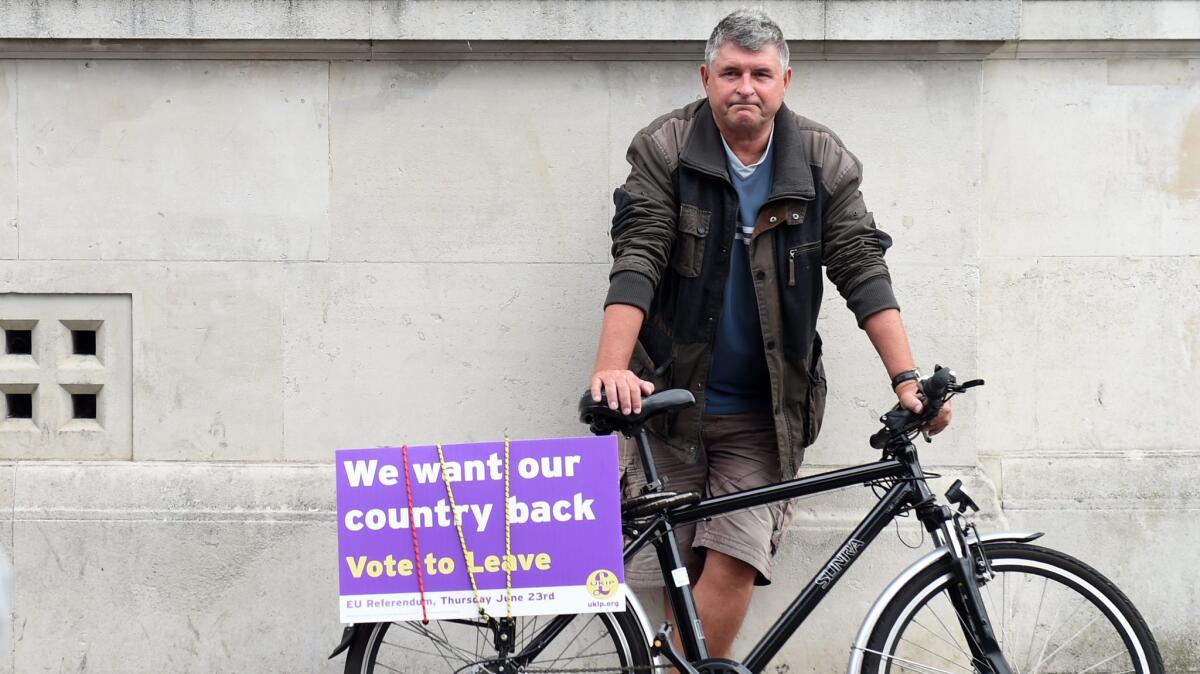Op-Ed: Dear Brits: Don’t listen to the U.S. on ‘Brexit’

- Share via
Dear British friends, I’m writing to say I’m sorry my president has been meddling so much in the debate about “Brexit,” your June 23 vote on whether to remain part of the European Union. The speeches, the BBC interview, the op-ed in the Daily Telegraph — it’s all been a bit much.
Still, good friends cannot help but offer advice. I’ve watched the polls swing back and forth — a recent Guardian/ICM poll suggested leaving is up 53% to 47%, while poll aggregators see a dead heat with about 10% of you undecided. As an American who’s worked in international affairs, lived in the EU, and loves both Burgundy wines and Devon clotted cream, let me offer you this bit of advice: In this existential decision, don’t let experts and politicians — yours or ours — scare you. Take everything with a dose of salt.
Of course, we all know that if Britain leaves the EU there would be some messy years of negotiations with Brussels. It’s hard to understate how complicated the task of detaching from the EU would be and how many people in Europe would be affected. But “complicated” does not mean impossible or disastrous.
I don’t envy those of you trying to make sense of the guesstimates about the economic impact. Yes, the “studies” indicate that Brexit would damage Britain’s economy, but it all will depend on what terms of trade remaining EU members would give Britain. One theory is that the EU (read Germany and France) would play hardball to punish you and dissuade other potential defectors (read Denmark).
I think that’s unlikely. Some 2.2 million non-British Europeans work in Britain. Not to put too fine a point on it, but London is full of young French workers who could not find jobs in France. Whether they are café waiters or bankers, François Hollande cannot afford for you to send them home jobless, so France will want to make reasonably nice. More than 750,000 Brits live in Spain, a good chunk of them retirees pouring British pensions into Spanish society. Madrid will not want to disrupt that.
Multinational corporations also will press for everything to stay the same. Kellogg’s provides breakfast cereals to Europe from a factory in Manchester; BMW sells Mini Coopers in Europe that are made in Britain. And so on.
In other words, because everyone has so much to lose, the post-Brexit economic landscape might look much like what exists now. Indeed, Britain might succeed keeping the economic benefits of the single market without its regulatory and financial burdens.
Most Americans probably agree with our president and would prefer that Britain stay in the EU. Besides fear of the unknown, I am not sure why.
Nonetheless, most Americans paying any attention to Brexit probably agree with our president and would prefer that Britain stay in the EU. Besides fear of the unknown, I am not sure why.
Different people have different reasons. In his Daily Telegraph op-ed President Obama argued that EU membership “doesn’t moderate British influence — it magnifies it.” But that really depends on the issue and the forum.
In many fields, U.S. diplomats actually might welcome the return of a separate British voice speaking for 65 million people and the world’s sixth-largest independent economy. On some issues Britain might work more closely with other Anglophone countries than with continental Europeans. Britain would get to speak its own mind at the World Trade Organization and other international institutions. Frankly, Britain would probably punch above its weight.
But Obama clearly meant something specific about Britain’s “influence.” He meant British influence in Brussels and, implicitly, the idea that Britain often echoes American perspectives in the EU’s internal deliberations.
Historically, no one was more responsible for this theory than French President Charles de Gaulle, who repeatedly targeted his post-World War II enmity toward les anglo-saxons, a term that for him implied a shared outlook between Brits and Americans. Of course, there is some truth here; a “special relationship” really does exist between our countries.
But it is also terribly old-school thinking — a lot like being a Gaullist. Simply put, the mental divide between continental Europeans and les anglo-saxons has narrowed considerably over the decades. EU/U.S. differences remain on a host of issues, but we hardly need Britain to speak up for us in Brussels when so many European leaders have Ivy League degrees, spent high school semesters in California, and grew up watching American films.
Obama’s activism may reflect a larger concern: that a British exit from the EU would commence a full unraveling of the European Union. If that is what he’s thinking, it is a bit insulting to Europeans because it fails to appreciate the full scope and depth of continental Europe’s post-1945 integration. The immediate refugee crisis and the long-term Euro debt crises are greater hazards to a united Europe than whether Britain leaves the club.
Indeed, a decision to Brexit is more likely to unravel the United Kingdom than the European Union. A Brexit vote may prompt the Scots — and perhaps the Welsh and Northern Irish — to demand new referenda on their independence from Britain.
But you don’t need me, or my president, to tell you that.
Justin Hughes was the chief U.S. negotiator for two recent multilateral treaties; he teaches international trade and intellectual property law at Loyola Law School, Los Angeles.
Follow the Opinion section on Twitter @latimesopinion and Facebook.
A cure for the common opinion
Get thought-provoking perspectives with our weekly newsletter.
You may occasionally receive promotional content from the Los Angeles Times.






